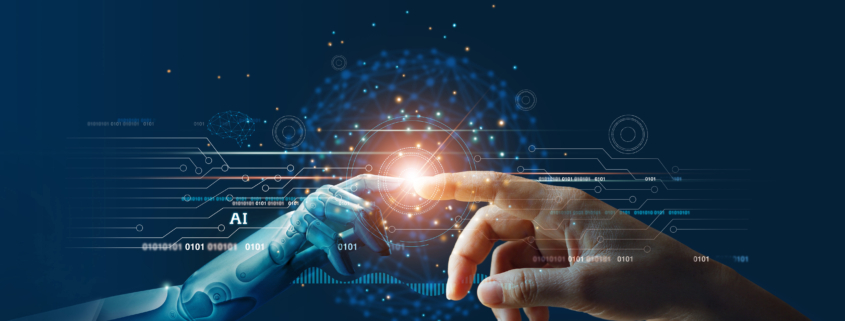The Rise of Artificial Intelligence in Banking
Banks in Wisconsin explore the use of AI
By Hannah Flanders
Just five years ago, the idea that AI, or artificial intelligence, could be incorporated into nearly every aspect of the human experience seemed like a topic for future generations. However, the further we wade into the 2020s, the more each of us comes to encounter aspects of AI in our daily lives, even without realizing it. As the capabilities of AI multiply and the number of individuals utilizing this unique technology expands, professionals in many sectors of the U.S. economy — including the financial services — are considering the ways in which AI impacts their business and the surrounding communities.
What is AI?
Despite what many think, AI is not a new phenomenon. Shortly after the creation of the first digital computer, scientists in the 1950s birthed the concept of AI as they explored the possibility of creating an artificial brain. Today, AI has molded into the creation of technology that has the potential to add efficiencies to our daily lives.
In its current state, AI is a computer system with the capability to sense, think, learn, and take action. Throughout the day, we may encounter AI technology by way of recommendations on our favorite streaming platforms, the anti-virus software that scans our emails for spam, or timed traffic signals. However, the Pew Research Center recently found in its study “Public Awareness of Artificial Intelligence in Everyday Activities” that only around 50% of individuals believed that they interacted with some form of AI more than twice a week.
As technology continues to become more widely available, the development of AI and its integration into day-today life has greatly increased. The New York Times states that in 2022, nearly $1.4 billion was invested into various generative AI companies worldwide. By 2030, PwC expects that AI will contribute over $15 trillion to the global economy by increasing productivity and allowing products and services to be more personalized and readily available.
AI in the Banking Industry
Already, banks around the country have employed AI in various areas of their daily operations. In 2020, McKinsey & Company reported that around 60% of financial institutions had already embedded at least one AI capability into their organization. In utilizing systems that have the potential to conduct research, translate languages, create messages, and write job descriptions — among so many other possibilities — banks are able to quickly detect fraud, streamline specific services, and interact with customers at any time of the day.
However, there are many more possibilities, as noted in a Forbes article “The Future of AI in Banking.” In addition to automating routine tasks, AI is great at tracking patterns, targeting product recommendations, providing more accurate customer support, and serving as a single point of contact for banking operations.
Despite these opportunities, many banks are concerned with the challenges embracing AI may impose. Among the top concerns of Americans, reports the Pew Research Center, are digital privacy and the lack of human connection.
Hello, ChatGPT
In November 2022, ChatGPT was released by OpenAI, a San Francisco-based AI research lab. The chatbot, unlike many others, offers detailed responses in many domains of knowledge. In early 2023, Reuters reported that the chatbot had reached 100 million monthly users.
GPT, which stands for Generative Pre-trained Transformer, is a type of Large Language Model (LLM). The UK’s National Cyber Security Centre describes an LLM as a type of algorithm that has been trained using a significant amount of text-based data, which can typically be found on the open internet. ChatGPT then utilizes “deep learning,” or the process of imitating human learning, to formulate humanlike responses.
The Benefits and Challenges of AI
Because ChatGPT is trained using free, unfiltered data sourced from across the internet, many are skeptical of its reliability and validity. However, it is important for users to acknowledge that many systems are programmed, using the desired or relevant algorithms and data, by humans. As many begin to harness the capabilities of AI, the benefits (and challenges) are becoming evident.
- Logic and Creativity
Rather than be influenced by emotion, most AI models only have the aptitude to make logical decisions. This capability, which may be beneficial in removing some forms of bias, may not consider the full picture of the data presented. In addition, the lack of emotion may result in less creative solutions.
- Human Connection
Unlike humans, AI is constantly available. While ensuring customers have around-the-clock access to the organization and its services is key in combating competition, many are concerned that AI may result in less human interaction or replace humans in the workforce.
- Privacy and Risk
American Banker stated that nearly 80 U.S. financial institutions reported a data breach in 2022. As increasingly more banks look to incorporate AI to analyze large swaths of data, the risk of personal information falling into the wrong hands rises. Because the security measures of ChatGPT, and other models, are determined by the organization or platform hosting the software, businesses should ensure that their risk management practices are up to date and monitored regularly.
- Implementation/Adaption
Although AI can minimize repetitive and time-consuming tasks, banks should first consider how employing new AI programs may interact with existing software. Additionally, if the adaption process requires extensive effort for both employees and customers, AI may not be the right solution.
- Regulation
As of this writing, financial regulators have not yet published a comprehensive set of AI-related rules. However, banks are reminded that existing regulation may apply. Several agencies — including the Financial Crimes Enforcement Network (FinCEN) and the Office of the Comptroller of the Currency (OCC) — are encouraging banks to engage with AI to determine its usefulness within their organization.
As more individuals throughout the country become aware of AI, it is important that bankers in Wisconsin closely follow its advancements and challenges as wells as continually explore the ways in which systems, such as ChatGPT, may impact their business, staff members, and customers, While ChatGPT may be just the latest trend, there is no doubt that AI has already left a lasting effect on the power of technology.








